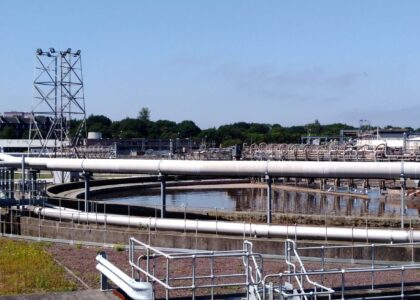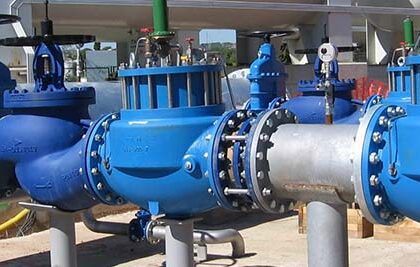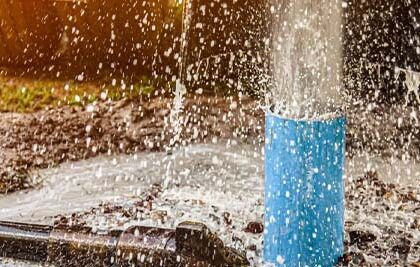We deliver on the most appropriate irrigation technologies based on suitability to terrain and crop type, drawing from a pool of most recognised methods of sprinkler, drip, or flood. Our involvement spans through from consultation, site assessment, irrigation system design, supply, and installation.
Based on our site technical assessment, we walk you through the different options for irrigation systems and guide you in selecting the appropriate choice that assures high quality performance, effectively meeting your irrigation needs. Our systems range from drip irrigation kits, sprinkler irrigation systems, travelling irrigators, and pivot centre irrigation systems.
A good irrigation system is one which is properly designed and sized to fit the job requirements. For various applications, terrain, and water sources, it requires research and careful technical design to achieve optimal system performance. Irrigation system design requires careful engineering, taking into account the land’s slope, contour, pressure, flow requirements, type of crop, soil type, and infiltration rate.
As such, during irrigation system design, pumps have to be carefully sized and selected, so as to be able to match the required operating pressures of the field. In addition, the sprinkler-nozzle combinations have to be carefully selected to match the operating pressure range, since too much pressure would disperse the water stream into very fine sprays, resulting in increased evaporation losses, or poor distribution.
Wind effects on sprinkler distribution patterns are more pronounced on fine droplet sizes. Conversely too little pressure would not sufficiently break up the water stream and would result in puddling, runoff, poor distribution patterns, and crop damage.
Our irrigation engineers help you to select and design the most suitable irrigation type and equipment fit for purpose, keeping in mind the need to achieve the highest water use efficiency while saving/conserving energy. We also help you design and implement combined irrigation systems that also deliver fertilisers, a process known as fertigation and chemigation. Our emphasis is on solar powered irrigation systems.
In areas of the country where wind speed is sufficient, our irrigation engineers can also help you design and implement wind energy driven systems. We can also help you design systems that rely on pico and micro power which can also be used to locally add value to your produce in case there is such potential in the locality.
Smart Irrigation
We deploy smart irrigation systems that offer “water on demand irrigation”. In essence, they monitor weather, soil conditions, evaporation, and plant water use to automatically adjust the watering schedule to actual conditions of the site.
This helps save both water and money (water efficiency). Our smart irrigation improves water use efficiencies as it tailors watering schedules to meet specific landscape needs. We fit your system with smart irrigation controllers that adjust sprinkler application rate based on site-specific variables such as outdoor temperature and soil type, so plants get water when they really need it.
Pressure sensors in smart agricultural irrigation.
This system is used in fields such as field planting, orchard planting, greenhouse vegetables, gardening, and greening.
Every plant has a humidity suitable for its growth. Too high or too low humidity is not conducive to plant production. Irrigation is to adjust the soil humidity within the range suitable for plant growth. The intelligent irrigation system is based on the provision of proper irrigation, achieving water and energy savings, and can greatly reduce labour costs. It is an automated and intelligent system developed based on contemporary technology.
The programmable controller collects data from sensors such as temperature, humidity, pressure, flow rate, etc. according to a pre-programmed program, and then controls the actions of pumps, valves, and other equipment so that the system can automatically irrigate according to a certain amount of water or a specified time.
Realisation does not require direct human operation, and the system automatically implements irrigation. In the whole process, humans only need to adjust the control program and overhaul the control equipment according to the actual irrigation needs, thus greatly saving manpower and material resources.
We can set the humidity alarm value according to the characteristics of the water demand of the plants. When the signal monitored by the humidity sensor is lower than the alarm value, the controller sends a signal to start the water pump for irrigation, and stops when the humidity value reaches the set value. You can also set timing. For quantitative irrigation, the control program is pre-programmed in the controller, and the start time, end time, irrigation time, and stop time are respectively set. The system automatically circulates irrigation according to the set time.
With appropriate irrigation scheduling, deep percolation and transport of fertilisers and agro-chemicals out of the root-zone is controlled, water-logging is avoided, less water is used (water and energy saving), optimum soil water conditions are created for plant growth, higher yields and better quality are obtained and rising of saline water table is avoided. In water scarce regions, irrigation scheduling is more important than under conditions of abundant water, since any excess in water use is a potential cause for deficit for other users or uses.
We also implement and provide the following under our irrigation plan.
- Solar water pumping and supply of electrical and solar submersible water pumps.
- Supply of irrigation kits and accessories.
- Design and construction of irrigation schemes i.e., drip irrigation, sprinkler irrigation, centre pivot irrigation, and travelling irrigation systems. We also construct the associated water storage dams and bulk water conveyance systems.
- Construction of greenhouses, hydroponic systems, and cattle drinking troughs.
- Supply of surface and submersible water pumps.
- Supply of hygrometers, pH meters, soil conductivity meters, pressure sensors, temperature and humidity sensors, and various programmable controller equipment for intelligent irrigation and soil moisture monitoring systems.
- Supply and installation of irrigation meters.
- Consultancy for preparation of national irrigation master plans.
Why it is important to install an irrigation water meter.
Inclusion of a water meter after the pump is important as it tracks both the efficiency of the system and that of the pump itself. Through recording of daily consumptions, if an unexpected excessive deviation from the norm is noticed, it may be an indicator of a leakage and calls for intensified inspection.
On the other hand, if it is noticed that water delivered was very low compared to the norm, it may be an indicator of reduced pump efficiency or that there is a challenge with the water source or the pre-treatment system before the pump. Either way, knowledge of how much water is used comes in handy. In the systems where irrigation water is paid for, this knowledge is a key input in the economics of the entire system.
Chemigation and fertigation.
The application of both chemicals and fertilisers can be done when using drip irrigation systems through injector pumps. These pumps allow for suitable delivery rate control, while backflow prevention protects both equipment and the water supply from contamination. These systems are very efficient since they deliver to the plant roots directly.
The application of fertilisers through the irrigation system (fertigation) is a common practice in modern irrigated agriculture. Localised irrigation systems are highly efficient for water application, and also suitable for fertigation. Thus, the soluble fertilisers at concentrations required by crops are applied through the irrigation system to the wetted volume of the soil. Fertigation (efficient fertiliser application) and chemigation (easy control of weeds and soil borne diseases) are being adopted widely for both food crops, ornamental crops, and on commercial farms.
Fish Pond Construction
Fish rearing (aquaculture) has emerged as a lucrative business lately, done at both subsistence and commercial levels. It is imperative to note that any successful aquaculture practice with a good harvesting is a direct result of proper construction, preparation, and maintenance of the fishpond.
Different types of fishponds exist, which can be earthen or concrete in nature. The exact type for a particular fish pond is dependent on factors such as terrain, water source, and quality of the soil at the proposed site, among others. At Hydro Concepts (U) Ltd, we undertake fish pond design and fish pond construction; guide you in managing water quality and pond dynamics for both earthen and concrete types of ponds, and done to the best of engineering standards.
We also supply dam liners and pond liners (geomembrane products) for all shapes and sizes of fishponds, shade netting, garden hoses, PVC heat welding generator sets, and supply and installation of floating cage systems used in cage fish farming on existing water bodies.











